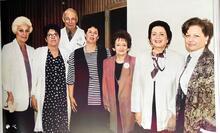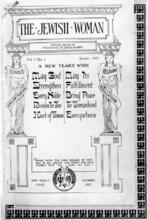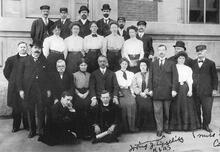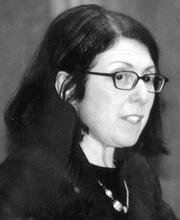Jennie Davidson Levitt
Jennie Davidson Levitt represented the finest synthesis of Americanism and Judaism, according to the leaders of the Minneapolis Jewish National Fund at a 1968 dinner in her honor. Deeply aware of her responsibilities as a financially secure Jewish woman, Levitt labored to improve social conditions for diverse groups in the United States and abroad. Her broad approach to social reform, and the particular issues that she addressed, paralleled the changing concerns of the National Council of Jewish Women, her most beloved organization for more than fifty years.
Jennie Davidson Levitt represented the “finest synthesis of Americanism and Judaism,” according to the leaders of the Minneapolis Jewish National Fund at a 1968 dinner in her honor. Deeply aware of her responsibilities as a financially secure Jewish woman, Levitt labored to improve social conditions for diverse groups in the United States and abroad. Her broad approach to social reform, and the particular issues that she addressed, paralleled the changing concerns of the National Council of Jewish Women (NCJW), her most beloved organization for more than fifty years.
Family and Education
Born on November 18, 1889, Jennie was the oldest of four children of Lithuanian immigrants, Saul and Mary (Cohen) Davidson. She grew up in a household that valued hard work, education, and charity. Saul Davidson had left Lithuania in 1879 at age seventeen and immigrated to Des Moines, Iowa, to become a peddler for an uncle who owned a peddler-supply business. He opened a secondhand furniture store in Des Moines in 1887, which developed into the Davidson Furniture Company by 1903, the largest retail furniture institution of its kind in Iowa. He married Mary Cohen in 1888, and the young couple took in boarders to supplement their income. Mary Cohen Davidson became an officer of the Hebrew Ladies Aid Society, and regularly donated food, clothing, and money to local poor families and impoverished relatives in Europe.
Jennie Levitt recalled a comfortable childhood with piano and elocution lessons. She and her sister Sarah were the only girls to study Hebrew at the Conservative congregation their parents helped to found. She further developed her leadership and oratorical skills as the only girl on the West High School debating team. She received a degree from the Highland Park Conservatory of Music in 1909 and a B.A. from Drake University in 1913. She married Thomas I. Levitt, a close childhood friend, in 1914, after which Thomas joined his father-in-law’s furniture business.
Activism
The Levitts moved to Kansas City, Missouri, in 1918 to open a Davidson Furniture branch and to Minneapolis in 1937 when the company reorganized. The mother of three children, Aaron, Norman, and Sarah, Levitt began volunteering in the 1920s. She explained her activism as carrying on her family’s charitable traditions, but her efforts extended beyond direct charity to working with voluntary political organizations focused on domestic and international issues.
Levitt was particularly active in Jewish women’s organizations. She served as president of the Kansas City branch of the National Council of Jewish Women from 1931 to 1936 and was a board member of both the Jewish Welfare Association and the Federation of Jewish Charities. In Minneapolis, she chaired the SOS division of the Joint Distribution Committee, was president of the women’s division of the Minneapolis Federation for Jewish Services, and served on the board of the national women’s division of the United Jewish Appeal. As a uniformed Red Cross Home Service worker during World War II, she helped to rescue Jewish children from Nazi Germany and to process immigrants after the war.
Levitt worked to strengthen the political influence of women as a board member of the League of Women Voters and of the District Federation of Women’s Clubs in Kansas City. Representing the NCJW, she became a peace activist in the 1930s and helped to organize Kansas City chapters of the World Peace Council and of Carrie Chapman Catt’s National Conference on the Cause and Cure of War. These organizations and the NCJW taught Levitt about the potential power of organized women.
Post-war Healthcare and Social Equity Work
Widowed in 1953, Levitt turned her attention in the 1950s and 1960s to building women’s hospital auxiliary organizations. She served as president of Mount Sinai Hospital’s Women’s Auxiliary in Minneapolis and of the Minnesota State Hospital Auxiliary Association. Distressed by the state’s decision to close state mental hospitals, she lobbied for the development of a volunteer program to assist patients in the process of returning to their communities. She also became a philanthropist in this period, donating major gifts to Mount Sinai Hospital, the NCJW, and the Hebrew University High School in Jerusalem. In 1972, she established the Jennie D. Levitt Institute for Research in Education of the Disadvantaged at Jerusalem’s Hebrew University.
Later Years and Legacy
Still active in her eighties, Levitt offered to march with the Mount Sinai Women’s Auxiliary to demand that a woman be appointed to the hospital’s board of governors. Remembered for her eloquent speeches, sense of humor, loyalty, and generosity to family and community, she relished taking charge in charity work. The National Council of Jewish Women and the Jewish National Fund honored her with testimonial celebrations. She represented a generation of American-born daughters and wives of successful Jewish businessmen, who devoted their energies to improving the quality of life in their local communities.
Jennie Davidson Levitt died in 1980.
Levitt, Jennie Davidson. Papers. In the possession of Thomas W. Levitt, Shawnee Mission, Kansas.
Levitt, Thomas W. [grandson]. Interview with author, May 1996.
Rosenthal, Frank. The Jews of Des Moines: The First Century (1957) Jewish Welfare Federation, University of Michigan. .
Smith, Beth K. [niece]. Interview with author, September 1996.
Solomon, Hannah G. Fabric of My Life (1946) University of Illinois at Urbana-Champaign.
Who’s Who in American Women (1968).
WWIAJ (1938).



![roisman.jpg - still image [media] roisman.jpg - still image [media]](/sites/default/files/styles/medium/public/mediaobjects/roisman.jpg?itok=7iKIF0ev)




